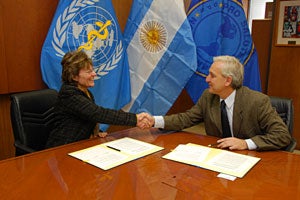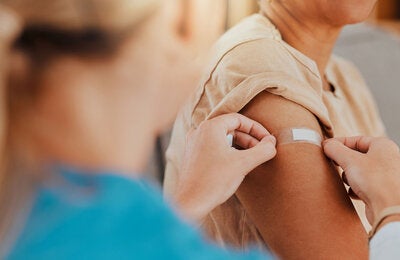Washington, D.C., March 11, 2008 (PAHO)- The Pan American Health Organization (PAHO/WHO) today signed an agreement of understanding with the White Helmets Commission of Argentina to unite forces and cooperate in responding to disasters and other emergencies.
The Pan American Health Organization (PAHO/WHO) today signed an agreement of understanding with the White Helmets Commission of Argentina to unite forces and cooperate in responding to disasters and other emergencies.

PAHO Director Dr. Mirta Roses and the president of the White Helmets Commission, Gabriel Marcelo Fuks, at the signing ceremony (Photo David Spitz/PAHO)
"In the current context, emergencies, whether natural or man-made, are likely to be increasingly frequent", said PAHO Director Dr. Mirta Roses.
Under the new memorandum of understanding, PAHO and the White Helmets Commission will collaborate in emergency preparedness and disaster response, working to improve regional response capabilities.
The president of the White Helmets Commission, Gabriel Marcelo Fuks, said at the signing ceremony, "In recent years I have seen that the concepts and ideas on emergencies have advanced a great deal in the regional context, but a great deal still remains to be done."
The White Helmets Commission is a humanitarian aid and peacekeeping agency based on an initiative launched by Argentina in 1993, and adopted by the United Nations General Assembly in 1994 and the Organization of American States in 1998. It has more than 4,000 trained volunteers and has participated in missions in numerous countries of the Americas and other continents.
PAHO agreed to make the SUMA Logistics Supply System available to the White Helmets and collaborate in training and joint responses, while the group agreed to hold joint training sessions and make its volunteers available for joint activities.
Links of Interest:
PAHO, founded in 1902, works with all the countries of the Americas to improve the health and quality of life of their peoples. It also serves as the Regional Office for the Americas of the World Health Organization.



